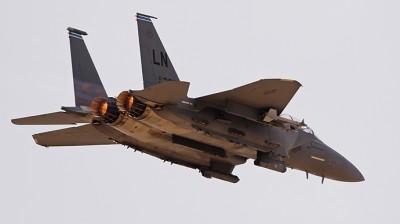This Is How Russia Handles Terrorists: Moscow Releases Video Of Syria Strikes

Now that Russia has officially begun conducting airstrikes on anti-regime forces operating in Syria, commentators, pundits, and analysts around the world will be keen to compare and contrast the results of Moscow’s efforts with the year-old US-led air campaign against ISIS targets in Syria and Iraq.
Clearly, Russia has a very real incentive to ensure that its airstrikes are effective.
Preserving the global balance of power means preserving the Assad regime and, by extension, ensuring that Iran maintains its regional influence.
On the other hand, the US and its regional allies actually have an incentive to ensure that their airstrikes are minimally effective. That is, for the US, Saudi Arabia, and Qatar, the idea is not to kill Frankenstein, but rather to ensure that he doesn’t escape the lab.
As we documented earlier today, Russia wasted no time launching strikes against anti-regime targets once the country’s lawmakers gave the official go-ahead and the West wasted no time accusing Russia of breaking protocol by targeting “modetrate” Syrian rebels (like al-Qeada) that aren’t aligned with ISIS.
It’s against that backdrop that we present the following footage released by the Russain Ministry of Defense which depicts the opening salvo in The Kremlin’s battle against terrorism in the Middle East (note the vehicle traveling towards the compound at a particularly inopportune time towards the end).
And predictably, Western media reports regarding civilian casualties and Russia’s alleged targeting of “moderate” rebels (as opposed to ISIS) were countered by Moscow’s sharp-tongued spokeswoman and US foreign policy critic extraordinaire Maria Zakharova.
Via RT:
Russia has struck eight Islamic State (ISIS/ISIL) targets in Syria, the country’s Defense Ministry said, adding that “civilian infrastructure” was avoided during the operations.“Today, Russian aerospace force jets delivered pinpoint strikes on eight ISIS terror group targets in Syria. In total, 20 flights were made,” spokesperson for the Russian Defense Ministry, Igor Konashenkov, said.
“As a result, arms and fuel depots and military equipment were hit. ISIS coordination centers in the mountains were totally destroyed,” he added.
Konashenkov said that all the flights took place after air surveillance and careful verification of the data provided by the Syrian military. He stressed that Russian jets did not target any civilian infrastructure and avoided these territories.
“Russian jets did not use weapons on civilian infrastructure or in its vicinity,” he said.
Reuters reported that Russia targeted opposition rebel groups in Homs province instead of Islamic State forces. The agency cited Syrian opposition chief Khaled Khoja, who put the death toll of the bombardment at 36 civilians.
“Russia is intending not to fight ISIL [Islamic State], but to prolong the life of [Syrian President Bashar] Assad,” Khoja said.
Similar claims were made by the BBC, Fox News, Al Jazeera and numerous other news outlets.
Moscow harshly criticized the reports, labeling them an information war.
“Russia didn’t even begin its operation against Islamic State… Russia’s Foreign Minister Sergey Lavrov didn’t even utter his first words at the UN Security Council, but numerous reports already emerged in the media that civilians are dying as a result of the Russian operation and that it’s aimed at democratic forces in the country (Syria),” Maria Zakharova, Foreign Ministry spokeswoman, told media.
“It’s all an information attack, a war, of which we’ve heard so many times,” she added.
Zakharova also said that she was amazed by the scale and speed of what she called “info injections” into social networks such as “photos of alleged victims” that appeared on the web as soon as the Russian operation began.
“What can I say? We all know perfectly how such pictures are made,” she said, remembering a Hollywood flick ‘Wag the Dog,’ which described the US media reporting on a fake war in Albania.
For those who missed it, see here for our assessment of the Western media’s take on the first round of Russian airstrikes (and by the way we, like Maria, were surprised at how quickly the propaganda machine kicked into high gear). Here is the bottom line:
The bottom line going forward is that the US and its regional and European allies are going to have to decide whether they want to be on the right side of history here or not, and as we’ve been careful to explain, no one is arguing that Bashar al-Assad is the most benevolent leader in the history of statecraft but it has now gotten to the point where Western media outlets are describing al-Qaeda as “moderate” in a last ditch effort to explain away Washington’s unwillingness to join Russia in stabilizing Syria. This is a foreign policy mistake of epic proportions on the part of the US and the sooner the West concedes that and moves to correct it by admitting that none of the groups the CIA, the Pentagon, and Washington’s Mid-East allies have trained and supported represent a viable alternative to the Assad regime, the sooner Syria will cease to be the chessboard du jour for a global proxy war that’s left hundreds of thousands of innocent people dead.

